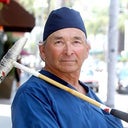Cheek Implant Specific Risks?
for malar implants to create a chiseled look on a male face, what are the specific risks? understandably theres all the usual surgery risks of infection etc, but its specifically nerve damage that worries me. how likely a risk is paralysis or nerve damage? is it important to have a maxillofacial surgeon do the work, and what are the things to check with the doctor, and what things have you personally seen go wrong and why? sorry for all the questions, just trying to educate myself on it more!




